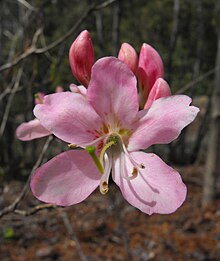Rhododendron vaseyi
| Rhododendron vaseyi | |
|---|---|

| |
| Scientific classification | |
| Kingdom: | Plantae |
| Clade: | Tracheophytes |
| Clade: | Angiosperms |
| Clade: | Eudicots |
| Clade: | Asterids |
| Order: | Ericales |
| Family: | Ericaceae |
| Genus: | Rhododendron |
| Species: | R. vaseyi
|
| Binomial name | |
| Rhododendron vaseyi | |
| Synonyms[3] | |
| |
Rhododendron vaseyi, the pinkshell azalea,[4] is a species of flowering plant in the heath family Ericaceae. It is endemic to the Appalachian highlands of North Carolina. The specific epithet vaseyi honors the American plant collector George Richard Vasey and his father Dr. George Vasey, Chief Botanist at the United States Department of Agriculture from 1872 to 1893. The species is sometimes referred to as the Vasey Rhododendron.
Description
[edit]Rhododendron vaseyi is a deciduous shrub that grows up to 5 metres (16 ft) in height. The large flowers are pink and begin to bloom in April.[5]
Taxonomy
[edit]Rhododendron vaseyi was named and described by the American botanist Asa Gray in 1880.[6] The type specimen was collected in 1878 by George Richard Vasey,[7][8] son of botanist George S. Vasey. Gray named the species in honor of both father and son.[9]
Distribution and habitat
[edit]Rhododendron vaseyi is endemic to the Appalachian highlands of North Carolina in widely scattered locations. While there is a main center of distribution west of Asheville, there is also a large population on Grandfather Mountain, in the northwestern corner of the state.[2]
In the wild, this species grows in acidic moist and wet substrates near bogs and streams. It may occur alongside other types of Rhododendron, such as Rhododendron maximum. The understory is made up of many ericaceous species, such as Vaccinium spp. and Leucothoe fontanesiana.[2] The plant can often be found in areas of the forest that have been recently cleared by logging operations.[10]
Conservation
[edit]Threats to Rhododendron vaseyi in the wild include destruction of habitat as land is converted to residential use, and poaching.[10]
References
[edit]- ^ Crowley, D.; Elliott, A. (2021). "Rhododendron vaseyi". IUCN Red List of Threatened Species. 2021: e.T200291164A200291557. doi:10.2305/IUCN.UK.2021-3.RLTS.T200291164A200291557.en. Retrieved 8 October 2024.
- ^ a b c "Rhododendron vaseyi". NatureServe Explorer. The Nature Conservancy.
- ^ "Rhododendron vaseyi A. Gray". Tropicos.
- ^ NRCS. "Rhododendron vaseyi". PLANTS Database. United States Department of Agriculture (USDA). Retrieved 21 October 2015.
- ^ Judd, Walter S.; Kron, Kathleen A. (2009). "Rhododendron vaseyi". In Flora of North America Editorial Committee (ed.). Flora of North America North of Mexico (FNA). Vol. 8. New York and Oxford: Oxford University Press. Retrieved 29 December 2024 – via eFloras.org, Missouri Botanical Garden, St. Louis, MO & Harvard University Herbaria, Cambridge, MA.
- ^ "Rhododendron vaseyi A.Gray". International Plant Names Index (IPNI). Royal Botanic Gardens, Kew; Harvard University Herbaria & Libraries; Australian National Botanic Gardens. Retrieved 29 December 2024.
- ^ "Specimen GH00015336: Rhododendron vaseyi A.Gray". Harvard University Herbaria. Retrieved 30 December 2024.
- ^ "Specimen US00037059: Rhododendron vaseyi A.Gray". Smithsonian Institution. Retrieved 29 December 2024.
- ^ Gray (1880), pp. 48–49.
- ^ a b "Pink-shell Azalea Rhododendron vaseyi". Center for Plant Conservation. 2011-10-26.
Bibliography
[edit]- Gray, Asa (1880). "Botanical contributions". Proceedings of the American Academy of Arts and Sciences. 15. Boston, Massachusetts: 25–52. Retrieved 29 December 2024.


